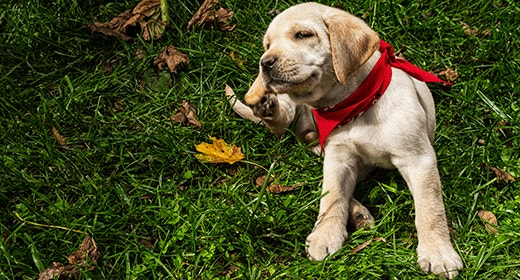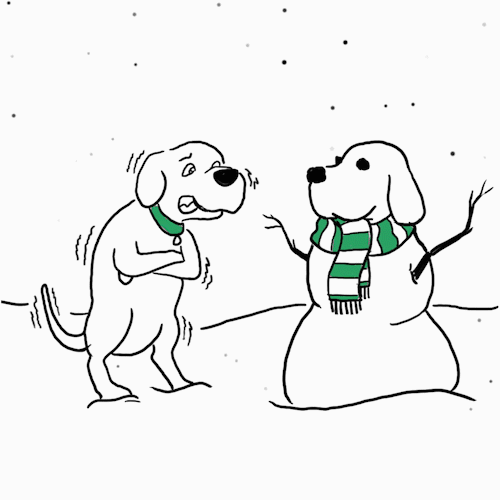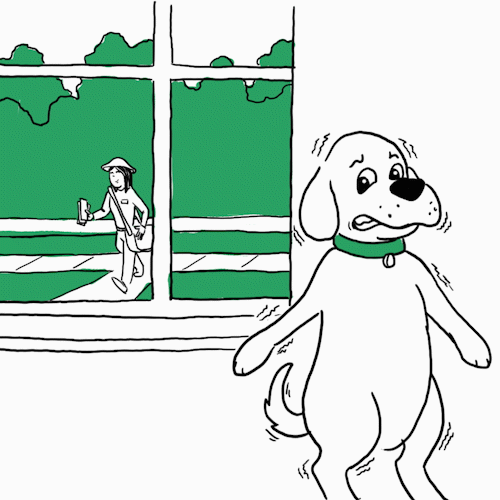

You do everything you can to keep your new puppy happy, and having fleas is definitely not a happy time. Keep these tips in mind to keep your puppy healthy, happy, and flea-free.
The common flea not only causes your dog discomfort, but it can also transmit disease, pass on tapeworms, and cause anemia, especially in vulnerable puppies and older dogs. Regularly inspect your dog for any signs of fleas. Intermittent scratching, biting, and gnawing, plus evidence of flea dirt between your dog's back legs or on top of his rump, are telltale signs of fleas. If your dog is constantly biting and gnawing himself or you can actually see fleas, you've got a full-blown infestation. To check out your dog for fleas, have him stand in a bathtub and vigorously rub your hands through his fur. If little dark dots fall on the tub floor, they're likely either fleas or flea 'dirt' (excrement). You'll know you've got fleas if the 'dirt' turns red when you add a drop of water.
These products work by preventing fleas from biting or reproducing. They are the flea control methods of choice, and when used faithfully as directed, help pet owners avoid many dog health issues associated with fleas.


We’re not talking about the “Sit. Shake.” kind of shake. Nor the fun way they shake off water starting from their nose all the way to the end of their tail. (FYI, dogs can shake off 70% of the water on their fur in just four seconds!)
No, we’re talking about that full-body trembling you’ve likely seen your pooch do from time to time. Why do they do it? And is it something you should be worried about? Let’s shake a leg and find out.
A majority of dog owners in an IAMS™ survey* (64%) think dogs shake because they’re cold. Other top responses were because they’re scared (57%) or anxious (54%).
High-fives all around because it turns out there are a number of reasons dogs shake, and all those are possible correct answers.

Just like their owners, dogs will often shiver when cold.
Opens a new windowDr. Tammie King, Applied Behavior Technical Leader at Waltham Petcare Science Institute, says: “Dogs shiver in response to falling temperatures. Dogs with short or no hair are especially susceptible. You should get them warm, put coats on them or bring them inside.” Same goes for you.

“Shaking is a response to epinephrine or adrenaline secretion — a sign of anxiety where the dog is on high alert,” says
Opens a new windowJames Serpell, B.S., Ph.D., Professor of Humane Ethics & Animal Welfare at the University of Pennsylvania School of Veterinary Medicine. You may notice this when you’re at the vet or there’s a situation where they feel threatened. Dr. Serpell also offers a way to help in some cases: “Identify what’s triggering the behavior. Provide them comfort. Going forward, you can gradually desensitize your pet to the thing it’s afraid of.” Unless it’s clowns. Those are always scary.
Trembling can also be a sign of serious issues like injury, poisoning or kidney disease. Opens a new windowDr. Jo Gale, BVetMed CertLAS MRCVS, Senior Manager, Global Science Advocacy at Waltham Petcare Science Institute urges pet owners to be vigilant: “If a pet is unwell in another way, they could be trembling.” If their shaking is accompanied by symptoms like diarrhea, limping or vomiting, you should consult your vet straight away.
*Surveyed U.S. dog owners, age 18+
Sample Size: n=201
Fielded May 8-10, 2020